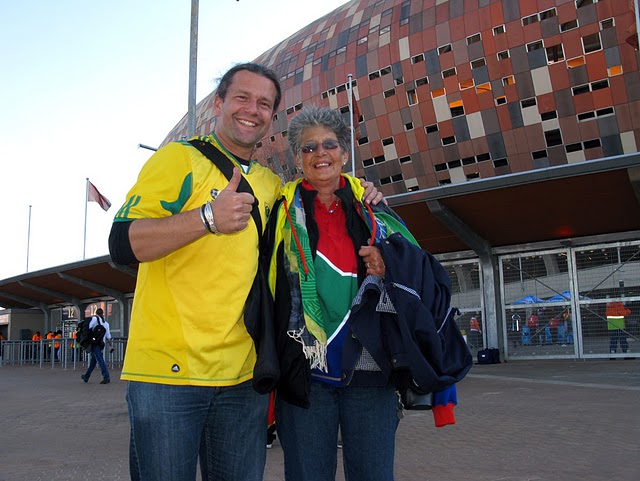
Guest Post by Chris Bolsmann (c.h.bolsmann [at] aston [dot] ac [dot] uk)
COVENTRY–In a week when South African cricketers and golfers recorded convincing victories, a hat trick of results would have seen South Africa’s women’s national team celebrate their first appearance at the Olympic Games by beating Sweden. But facing a team ranked 4th in the world, Banyana Banyana (Zulu for “the ladies”) could not pull off the miracle win.
The South Africans met their Swedish counterparts in Coventry, 100 miles north of London, in the second match of a double header. Japan beat Canada 2-1 in the early game in front of 18,000 spectators, while the 2011 World Cup third-place finishers defeated South Africa 4-1.
Normally called the Ricoh Arena and home to Coventry City FC, the City of Coventry Stadium looked quite different from its normal appearance full of advertising hoardings. The Olympic organisers were not quite able to cover up all of Coventry City’s history though, as a photo of the 1987 FA Cup winning team adorned one of the stadium walls.
While Banyana Banyana have always worn the yellow and green colours of the South African Football Association, this time the squad entered the pitch in a horrible-looking green and white vertically striped kit, courtesy of the South African Sports Confederation and Olympic Committee’s official kit supplier: Erke, from China. The crowd had dwindled to a few thousand for the second match and the majority of photo press had left the stadium. A small contingent of South African fans remained who were vocal throughout but were outnumbered by Swedish fans and locals who supported their European neighbours.
Sweden kicked off and, ominously, twice hit the cross bar in the opening six minutes. The Scandinavians went ahead in the 7th minute thanks to a Nilla Fischer shot from outside the box that was cruelly deflected past United States-based Roxanne Barker in the South African goal. Then the Swedes again hit the cross bar and doubled their lead in the 20th minute when Lisa Dahlkvist poked home a ball from the flanks. A minute later Sweden scored a third goal when South African stalwart Janine van Wyk was beaten for pace on a through ball and Lotta Schelin slotted past the on rushing South African keeper. After 21 minutes Banyana’s debut had turned into a nightmare and a real humiliation was on the cards.
The South African midfield were constantly over run by the more forceful and creative Swedes and the defence were outpaced on numerous occasions, allowing for the Swedes to cross balls into the box at leisure. To her credit, Barker dealt well with crosses and high balls and remained calm under constant Swedish pressure.
The second half saw Banyana kick off with far more purpose and creative intent. In the 60th minute, Portia Modise, a former World Player of the Year nominee, dispossessed a Swedish midfielder well within the South African half and from inside the centre circle unleashed a wonderful strike to beat Hedvig Lindahl. Modise’s goal restored South African spirits and momentarily gave South African supporters some hope. But three minutes later Schelin got her second goal of the match and restored the three-goal margin.
The final quarter of the game saw South Africa struggle with fitness and the match ended with a resounding victory for the Swedes. Sweden had over 57% possession and outshot South Africa 21 to 7. Banyana Banyana were outclassed by a technically superior and fitter Swedish side. After the shock of allowing three goals within 25 minutes, Banyana settled and showed a few individual moments of skill but were unable to retain possession for any length of time. It won’t get any easier in this tournament for South Africa: they face Canada on Saturday and World Champions Japan the following week.
Tag: Chris Bolsmann

Chris Bolsmann (Sociology, Aston University) is the special guest in our latest episode of the Africa Past and Present podcast reflecting on the 2010 World Cup. Topics covered include experiences at stadiums and fan parks in South Africa; FIFA‘s Disney-fied World Cup; Pan-Africanism and the performance of African teams; and the political and economic impact of the tournament.
Click here to listen to the podcast. (mp3)